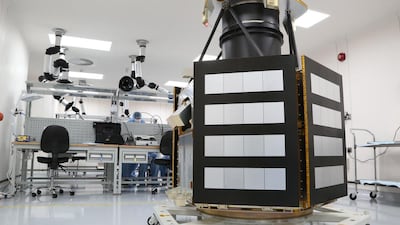ABU DHABI // The first satellite built entirely by Emirati engineers took a step closer to realisation on Wednesday, with the completion of its final design.
The Mohammed bin Rashid Space Centre (MBRSC) announced the completion of the final design stage of KhalifaSat before work begins on its manufacture in Dubai ahead of its launch in 2018.
“This significant milestone is an advanced step, not just in terms of the development of KhalifaSat, but reflects also on the satellite-manufacturing sector in the United Arab Emirates,” said Yousef Al Shaibani, director-general of the space centre.
Mr Al Shaibani said KhalifaSat would be the first practical step in manufacturing a satellite built by Emirati expertise in the UAE.
Salem Al Marri, assistant director-general of scientific and technology affairs at MBRSC, said the announcement was a significant moment for the space centre, because it had been 10 years in the making.
The road to the first all-Emirati satellite began in 2006 with a group of local engineers heading to South Korea to develop the first Emirati satellites, DubaiSat-1 and DubaiSat-2.
After eight years of working abroad the Emirati engineers returned in March last year to apply their knowledge at home.
“Now we are able to use UAE skills on UAE soil to manufacture and assemble satellites in our own facilities,” Mr Al Marri said.
The 68-strong all-Emirati KhalifaSat team recruited 50 per cent more engineers during the past year.
Mohammed Al Harmi, one of the engineers who returned from South Korea, said the determination among the engineers on the project was unbelievable.
“We promised Sheikh Mohammed bin Rashid we would be back in 10 years to start the project here and we came back in nine,” said Mr Al Hamri, who is director of the space operations department at MBRSC.
A graduate of the American University in Dubai who majored in software engineering, he said the fact that more than 90 per cent of Emiratis working on the project were products of local universities should encourage more Emirati youth to become involved in the space sector.
“Students shouldn’t be intimidated by the fact that designing satellites is rocket science.
“I thought I would have to get a degree in a specific field, but just getting any kind of engineering degree can lead you to space,” he said.
The latest Emirati satellite is set to improve on the capabilities as well as complement the existing Emirati satellites in orbit.
With greater imaging resolution, image downloading speeds, memory and manoeuvrability than DubaiSat-1 and DubaiSat-2, KhalifaSat will provide an increase in the number and sharpness of images.
Amer Al Sayegh, director of the space systems development department at MBRSC, said numerous UAE government and non-government entities would benefit from KhalifaSat.
On the public side this included municipalities and city planning, and police departments and the RTA with regard to traffic management.
“Currently DubaiSat-2 passes over Dubai every morning, but KhalifaSat will orbit over us each afternoon, so if you are interested in gathering information on that time of day, say on traffic, then we’ll be able to provide that,” said Mr Al Sayegh, who is also the KhalifaSat team project manager.
With a better pointing accuracy and manoeuvrability the new spacecraft will be able to capture more than one area in the same pass.
“We used to have to wait four or five days to get images of the same area twice, but now that will be reduced to just one or two days,” he said.
Mr Al Sayegh said the passion demonstrated by the engineers to innovate and enhance KhalifaSat would make it one of the world’s best in its category.
tsubaihi@thenational.ae

